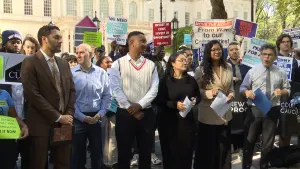More Stories
A study conducted in the Hudson Valley is
shedding light on patients with long COVID who suffer cognitive
issues.
Middletown seventh grader Connor Dellaporte
says he wasn’t too affected when he got COVID-19 in November. However, the
12-year-old says a big impact from the virus came months later as he started to
have a hard time concentrating.
“It’s just really harder to focus when I'm
trying to do an assignment,” Dellaporte says.
Mother Rachel Whittemore says her son is
experiencing long COVID, or a lingering symptom from catching the virus.
"It's a little frightening because we
don't know what the effects are,” Whittlemore says.
A newly published study conducted at
Westchester Medical Center gives insight to the cognitive effects of long COVID
six to eight months after contracting the virus.
"We felt it was important to document
and validate that what these people are complaining about are real problems,”
says Dr. Stephen Ferrando, the study’s lead author.
In the study, 60 adults were tested. The
results show low neuropsychological performance.
“Attention and concentration, slow
thinking…they don't process information as quickly. Memory problems,
particularly longer-term memory,” Ferrando says.
The study found that those with extremely low
cognitive performance also had worse symptoms when they had COVID-19.
The research shows that there are signs that
some of these issues do improve with time and treatment.
Phase two of the study is underway and
involves studying the impacts of long COVID-19 among those who contracted the
Omicron strain.
To participate, individuals must have a
documented positive COVID-19 test after Dec. 21, 2021, an eighth grade level of
education, be fluent in English language and over the age of 20 years old.
If you would like to participate, call
914-216-7733 ext. 2 or email Dr. Ferrando at Stephen.Ferrando@WMCHealth.org.
More from News 12
2:34

Guide: Safety tips to help prevent home burglaries
2:19

Guide: Safety measures to help prevent fires and how to escape one
2:40

Mayor's budget cuts: A controversial solution amidst immigration crisis
2:07

Tips on how to avoid confrontation with sharks while swimming in the ocean
2:33

5 tips to prevent mosquito bites and getting sick from viruses
2:39
